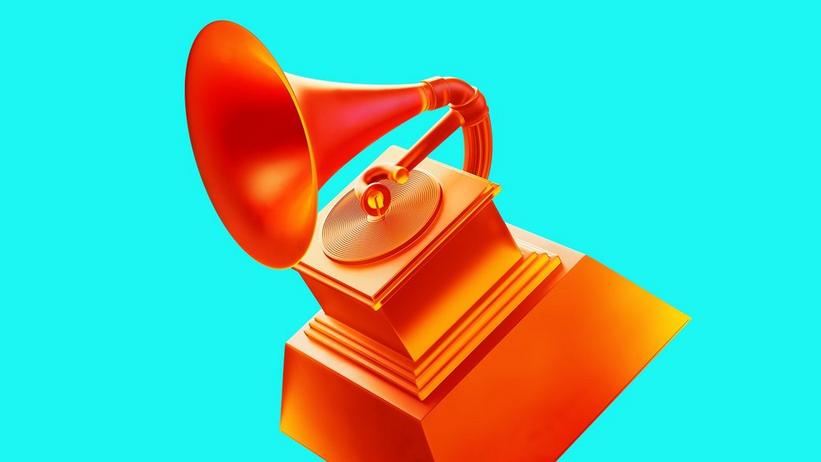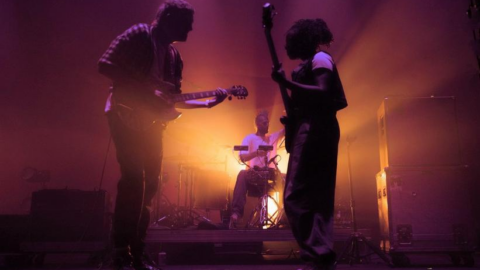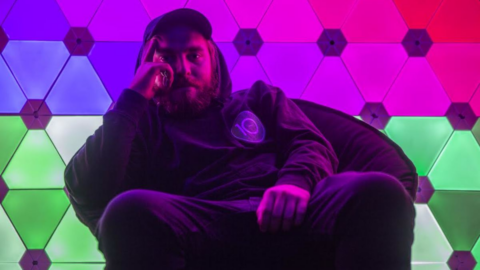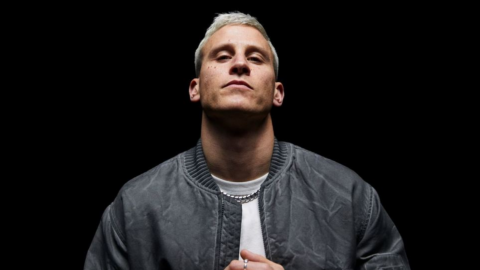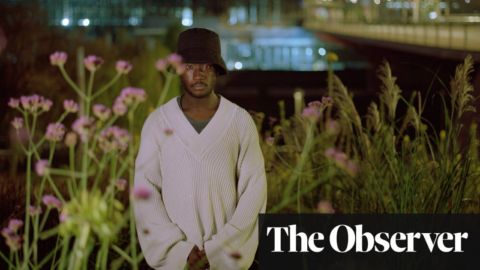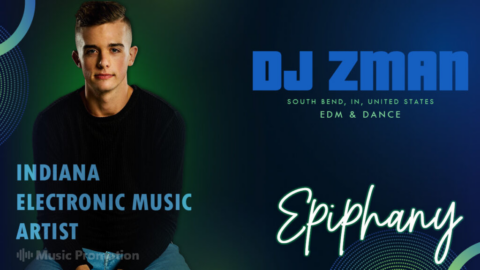Be the first to find out about GRAMMY nominees, winners, important news, and events. Privacy Policy
Graphic: The Recording Academy
news
Ahead of Music's Biggest Night on Feb. 5, 2023, celebrate with this spirited playlist of every Dance/Electronic Music nominee at the 2023 GRAMMYs.
2022 marked the thrilling return to the dancefloor, and the music nominated for the 2023 GRAMMYs in the Dance/Electronic Music field keeps the party going. There are two categories in the Dance/Electronic Music field of the 2023 GRAMMY nominations, and you can hear all of the nominees in one playlist.
The nominees for Best Dance/Electronic Recording stimulate listeners with poppy drama and emotion. Beyoncé's "BREAK MY SOUL" spotlights house music with sensuality, while Bonobo's "Rosewood" and RÜFÜS DU SOL's "On My Knees" pulse with a steady, infectious vigor.
Collaborations are key in this category. Diplo and Miguel's "Don't Forget My Love," David Guetta and Bebe Rexha's "I'm Good (Blue)," and KAYTRANADA and H.E.R.'s "Intimidated" all excite with passionate, soul-stirring energy.
Nominees for Best Dance/Electronic Music Album include Beyoncé's Renaissance, Bonobo's Fragments, Diplo's Diplo, ODESZA's The Last Goodbye, and RÜFÜS DU SOL's Surrender. Dynamically blending disco, pop, R&B, and future bass. These high-energy albums light the fuse of a party that can burn all night.
Listen to all of the above songs and albums in this comprehensive playlist of the Dance/Electronic Music GRAMMY nominees at the 2023 GRAMMYs.
Check it out on Pandora, Spotify, Apple Music, and Amazon Music — we'll see you at Music's Biggest Night on Sunday, Feb. 5!
Playlist powered by GRAMMY U.
2023 GRAMMY Nominations: See The Complete Nominees List
Photos (L-R): Scott Dudelson/Getty Images for Coachella, Kevin Mazur/Getty Images for Harry Styles, Kevin Mazur/Getty Images for The Recording Academy, LUFRÉ, Axelle/Bauer-Griffin/FilmMagic
news
Get to know the 2023 GRAMMY nominees with this year's official playlist, celebrating stars in genres ranging from pop to reggae to country.
With the 2023 GRAMMYs less than a month away, excitement is bubbling over in the music community.
Whether you're rooting for innovative newcomers like Wet Leg and Omar Apollo or beloved legends like Beyoncé and ABBA, there is an abundance of spectacular talent to be celebrated this year. And the 2023 GRAMMY nominees are not only leading, but creatively transforming genres, from rap to alternative to reggae — and beyond.
To let the music speak for itself, GRAMMY.com curated this immersive, 140-song playlist featuring 2023 GRAMMY nominees, including BTS, Harry Styles, Kendrick Lamar, Lizzo, and many, many more.
Get to know this year's nominees by listening to their biggest hits and most celebrated works on this Amazon Music playlist — and tune in to CBS on Feb. 5 to experience Music's Biggest Night live.
Photo: Tommaso Ottomano
interview
The Italian quartet first exploded onto the scene with a viral cover of Frankie Valli and the Four Seasons, but Måneskin have continued to exalt and evolve vintage rock thrills on their own terms — all on the way to their first GRAMMY nomination.
A dizzy smile spreads across Måneskin vocalist Damiano David’s face as he attempts to capture the group’s fervent energy in words.
"Going into a room where there's silence and going out with a song. Stepping on stage and then the crowd screams for you. Doing interviews where you can talk about how you think about music," he says. "It's such an open art language, such an open world."
While Måneskin’s inimitable swagger have led to a recent international meteoric rise, the Italian quartet have tapped the glitter and grime of rock’s glory days since forming as teens in 2016. Just a year later, the group made a massive leap, winning the Italian edition of reality competition show "X Factor." But it was Måneskin’s hard rock take on Frankie Valli and the Four Seasons’ "Beggin'" was inescapable following their 2021 Eurovision win — a smash success that led many eager new fans to dig into Måneskin’s catalog of chart-topping albums in their native Italy.
That prowess, ability to connect with the full spectrum of listeners, and a raucous live show netted Måneskin a GRAMMY nomination for Best New Artist at the 2023 GRAMMYs, which take place Sunday, Feb. 5, at the Crypto.com Arena in Los Angeles and will broadcast live on the CBS Television Network and stream live and on-demand on Paramount+ at 8-11:30 p.m. ET / 5-8:30 p.m. PT. They are also a living rebuke to those questioning rock’s staying power, whose grandiose energy and adventurous fashion begs for a yet wider audience.
"This combination is really magical. It gives us the opportunity to play something that doesn't exist so much in the charts," says guitarist Thomas Raggi. "We are rock, of course, in attitude, in the music, but we can reach really different people from different places and different ages."
Global success hasn't changed Måneskin much, as their new record, Rush!, teases. Due Jan. 20, the album only reinforces their bombast via singles like grimy party-starter "Mammamia" and the slinky and suave "Supermodel" — not to mention a guest appearance from Rage Against the Machine’s Tom Morello on the recently released "Gossip."
GRAMMY.com caught up with Måneskin — David, Raggi, bassist Victoria De Angelis, and drummer Ethan Torchio — to talk about the shock of their GRAMMY nomination, how they’ve evolved into their upcoming new album, and trying to find good espresso everywhere on tour.
This conversation has been edited for clarity.
I want to wish you congratulations on your first GRAMMY nomination. After winning "X Factor" and earning various accolades, has this sort of honor started to feel natural?
Victoria De Angelis: Not really natural, but very cool. It's the craziest thing you can possibly think of.
Damiano David: Of course, when we started, we only thought the biggest thing that could happen was being big in Italy. And then everything happened, so of course our dreams got bigger and of course we thought about it as a possibility in the remote future. Not, like, now. [Laughs.]
That's such a beautiful sentiment. The bigger doors start opening to places that you never could imagine. I can imagine that puts a whole new spin on what it is to be a band, what it is to be a musician.
De Angelis: It really does. Especially touring and everything, even six months makes so much difference. We look back at the things we did six months before and we say, "Okay, now we can add this, we can change this." It's constantly developing. So that's really inspiring and keeps us in a creative process all the time.
David: We've had so many crazy things happen these last two years. We played for the Stones. We played with Iggy Pop. We met like 50 percent of our childhood idols. At the end, wrapping it all up with the GRAMMY nomination, it's a pretty huge deal. The whole journey has been remarkable and we're gonna think about it for a long time.
It seems that you’ve remained remarkably close-knit as a band, which must be so important in the midst of that. How have you remained creatively inspired by one another and that you are constantly pushing yourselves as musicians through all the fame and success?
Ethan Torchio: Fame and success, it's just a coincidence. We don't really focus on that. It's part of our life, part of our journey. But it's an important point: We've always been friends with each other, and we've shared half of our lives together.
David: It's very important to us to be close because, otherwise, this project wouldn't be what it is now. We are four [individuals], and we are very human and curious about ideas. It's not just about what we are or we feel inside, it's also what we live outside. I truly think that [embracing] the new and something that has not been created before is part of our mindset.
De Angelis: As you said, being four, we actually inspire one another even more. We are very different personalities and also have very different taste. And being four, the amount of music we can discover, it happens every day. And also we love to go see shows, so maybe some of us go to one show and then we are like, "Hey, I got this idea from this show." Being four, it keeps us in this creative environment where everyday there is something new.
Touring constantly and being away from home can make you question your identity. How do you keep tied to your roots?
David: It's still pretty easy for us because even if we travel so much, we still live in Italy. When you move from your country and you live in another country for five, 10 years, then you start changing the way you live. But now we kind of bring this huge Italian suitcase with us. We're still asking for espresso everywhere. [Laughs.] With very bad results. How we interact between us and with people, our clothes, our style in general, it's always Italian in a certain way.
It's a difficult needle to thread, needing to mold to a comfortable stance wherever you are while also standing out. Being nominated for a GRAMMY must be an extraordinary test of that balance, so it's amazing to hear that you're still like keeping so true to yourselves.
De Angelis: I think that's always been kind of easy for us in some way, because we've always had such a strong and clear idea about our identity and what we like to do. Just look at this: [points to her shirt, which reads Italians Do It Better]. We've been lucky to never experience this kind of issue. On the other hand, what we experienced is that we had a very clear idea and then maybe it was hard to keep it safe and not let other people get into it or change it. But when it comes to what we stand for, we're always very sure about that.
Talk to me a little bit about that process, then. You all seem to find clever ways to reimagine classic genres and scenes while still honoring their essence.
David: We've been very, very lucky because our only rule has always been being true to what we like — even if we are very, very different one from each other. Vic [De Angelis] and Thomas Raggi especially have a very rock and roll classic background. I'm more into mainstream and low-tempo music. And Ethan [Torchio] actually listens to everything, from very mainstream music, classical music, to crazy experimental [music].
We've always tried to keep the balance between the four of us, and especially in the next album. We really wanted to embrace the difference between the four of us. It has created a personality for the group that also made the four of us very recognizable. People can feel represented from [each of the] four of us and from the group. Every achievement that we get, for us it's not, "Okay, we want this so we have to keep doing the same thing." It's more like, "Okay, we want this because this is our mindset. We have to keep this mindset, not because it makes you win awards but because it makes you recognizable and it gives you an identity and it puts you in a specific place in the market and in the industry.
I'm curious whether your writing and recording processes changed much on your new album, Rush! With first albums, sometimes a band will throw everything at the wall to see if it sticks. On the second one, they might shift things based on audience reaction, and then the third record can either attempt to capture a true self again or push to try even more new things.
De Angelis: It was 50-50, because some of the songs we actually wrote a while ago. There's a song we wrote three years ago, for example, on the record. The whole record was written in different moments. Some of the songs we wrote in the countryside in Italy; we went to this home studio and just jammed all together. And then others we wrote here in L.A., but then we also kept doing them in Japan and in Brazil while we were on tour.
So it's been really crazy. We can hear the moment we wrote the song and the emotion we had in the moment. And it portrays this whole journey we've been through. I think it's cool that we didn't only write it in one month, but it was through the years. It shows the different faces of our personalities and development.
I wanted to ask about the song "Kool Kids", which you recently debuted live. The lyrics have this self-aware edge, where you poke at the idea of whether rock is dead — I'm sure because you’ve been bombarded by that question nonstop.
David: We talk about rock and roll because it's a part of what we do, but I think that you can apply this kind of thought to every music genre. There's no music genre that is actually ever gonna die because trends are constantly changing. The music is developing and sometimes things become other things or change slightly because of the age where they're living. But I think that what we do [is] a new way to do rock and roll, but it's not the way to do it. There's many different ways to do it. You can be super classic, you can do rock and roll music even without analog instruments and go full electro while creating rock and roll structures.
Raggi: Nothing really ends. Nothing really starts. Everything changes.
De Angelis: It's always in development. The motion that rock music created and that pushes us to do it is just that sense of rebellion towards the norms, or when people try to put you in boxes or limit you. This kind of human feeling will always exist. And that's the reason why all these musicians through the past years have been making this kind of music — to oppose something and to talk about it.
Why was music the path you chose to express that perspective?
De Angelis: I think we all started as kids so we didn't even think it did that much. It was just something in us that we had to get out in some way, to express. It just came natural for us to do it as music. When we started playing together we were like 14 years old. We were struggling, all of us individually, to find other kids that were as passionate about it and wanted to invest all their time in this.
It was crazy that we were 13 years old and wanting to be, like, six hours in a rehearsal room every day instead of going out with friends or whatever. But for us it was such a fulfilling experience when we got in the rehearsal room that we just went full in and didn't care about anything else. It just took over us. It was just something so pure that we felt in that moment. The passion came out because we felt we were being ourselves and expressing what we had inside that couldn't come out in other ways. Since then, it has developed in so many ways that it's just who we are nowadays. We couldn't even imagine who we would be without the music.
Raggi: I remember also when I saw my first guitar outside of that guitar shop. No one in my family plays instruments or stuff like that. It was something that just called to me.
Another thing you are all known for is your sense of style. You always go big! Do you have plans for the GRAMMYs red carpet yet?
De Angelis: We're gonna surprise you. [Laughs.] We won't be boring. Promise.
Meet The First-Time GRAMMY Nominee: Omar Apollo On "Evergreen," Growth & The Art Of Longing
Photo: Arturo Lorde
interview
On 'Com Fly Wid' Me,' Shaggy's second collaboration with Sting, the dancehall toaster-turned-crooner tackles the Frank Sinatra songbook through the lens of reggae. Shaggy spoke with GRAMMY.com about his long history of interpreting the greats.
"There’s no need for purist music," says reggae icon Shaggy, who brought this attitude to an unlikely source.
His latest album, Com Fly Wid Mi, runs Frank Sinatra songs through a filter of ska, swing, and reggae rhythms. On his second collaboration with producer Sting, Shaggy dropped his signature dancehall toasting voice in favor of a new croon, which floats through a range of Ol' Blue Eyes' tunes — from “Luck Be a Lady” to “Fly Me To The Moon."
"Whatever we're doing has already been done by somebody, but it's the feel that you put in that makes it different," Shaggy tells GRAMMY.com. The pair's unique feel netted Com Fly Wid Mi Best Reggae Album nomination at the 2023 GRAMMYs.
Shaggy — born Orville Richard Burrell — has been making musical nods to his predecessors since 1993. That year, he released a high-energy dancehall version of “Oh Carolina,” a 1958 Folkes Brothers tune that was an early hit in the genre of ska, the precursor to reggae music.
Since then, Shaggy has released more than a dozen albums, often featuring an eclectic range of samples — from Steve Miller Band's "The Joker" to Cyndi Lauper's “Girls Just Wanna Have Fun.” He frequently collaborates with artists like will.i.am, Maxi Priest, Spice, Chaka Khan, Sean Paul, and Barrington Levy. Shaggy’s music has won two GRAMMY Awards, a Brit Award and a Juno award; he received an honorary degree from Brown University and a Jamaican order of distinction.
From his home studio in Miami, where he's worked for many years, Shaggy spoke with Grammy.com about his love of reggae and how Sting helped him learn to appreciate his own voice.
How are you? What have you been up to?
I had a great year. We toured Europe and Australia, and had a really good time. I teamed up with Sting again to do crazy things and we released this album Com Fly Wid Mi. With this project, I didn't know what we were doing and how it would go. But we had a vision.
But the year was also bittersweet because I lost [bass player and producer] Robbie Shakespeare of Sly and Robbie. He was a mentor of mine, like a father figure to me. We went to the funeral and that was rough.
Shakespeare was one of the greatest musicians and also an amazing person. Humility is the biggest thing he taught me. As a person from the ghetto, he helped me realize my purpose. He would say you're here as a servant to change people’s lives.
Well you clearly listened. Don’t you think you’ve found your purpose?
In '93, when we did [a cover of the Folkes Brothers 1959 song] “Oh Carolina,” I was dubbed a one-hit wonder by British tabloids. I had flipped an old song and it went Top 5. It was the first time a dancehall song went to the top.
They said I’d never get another one. They said you’ll never write your own hit. The next record I wrote, it had to be bigger, and I had to write it myself, so I wrote Boombastic” which won a GRAMMY [for Best Reggae Album at the 38th GRAMMY Awards]. So it was off to making history from that point on.
Why did you and Sting decide to interpret Frank Sinatra songs in a reggae style?
Look at artists like John Holt, who wrote “The Tide is High,” which Blondie covered. In his earlier days, he was super popular, and used to do a lot of older American pop songs and soul songs that became part of the Jamaican songbook.
When I listened to [Jamaican radio station] Irie FM in the late '80s and early '90s, they played a lot of American music, as well as country music from Kenny Rogers and Dolly Parton. Songs by Bing Crosby, Nat "King" Cole, and Patti Page were played in my house, with chicken and rice and beans for Sunday dinner. Growing up as a young Jamaican, I heard that music a lot. It’s not by chance that Sting heard me singing Sinatra songs for fun.
I became known for my signature dancehall voice from Boombastic, but with Sting in the studio, he heard my real voice. He said you can really sing, you’re not just a dancehall singer. He was in love with my voice and pushed me out of my comfort zone. I’m not really comfortable with my singing, but Sting is a great producer and my big brother, so if he says sing, I will sing, no matter how uncomfortable it is.
Why are you not comfortable with your singing?
I came up in dancehall, so my heroes are Josie Wales, Super Cat, and Shabba Ranks. Those guys are giants. In dancehall I was getting big hits, so I was comfortable only in playing that part, but if you're comfortable, you are stagnant, and Sting kept pushing me to be uncomfortable.
What unique challenges and opportunities did you both experience turning Sinatra tunes into reggae songs?
The main challenge is that it could easily get corny. Also, Sinatra songs are jazz tunes with five or six chord changes, but most cool reggae is just two chords, so we had to limit the changes to make it cool. So we had to figure out which chords to take out to make it reggae. It can’t be too jazz, or too reggae, so that was the balance.
That’s where the genius of Sting came in. He knew what notes to take out but how to keep the melody that makes it work. That took effort. It's really cool to know I did something cool that nobody had done.
You’ve worked with Sting twice now, and your previous collaboration with Sting, 44/876, also won a Best Reggae Album GRAMMY Award. How is your work with Sting different from other projects you’ve done?
This is an unlikely pairing. We’re from two different eras, and he’s a giant. We have a good f—ing time bro. We tell jokes and we're laughing.
He clearly knows way more about music than me, but admires me enough to work with me. In the studio, I’m throwing freestyle and gibberish. He said he had never done that; he’s usually by himself working quietly. He said he had never seen anyone write songs as quickly as me. I write about four songs a day. I never paid attention to the instrumentation as much, but he taught me to pay attention and be a part of it.
Sting said he watched [Aston] “Family Man” [Barrett] play with Bob Marley and tried to emulate him on bass, but couldn't do it. So he came up with a hybrid, and that became the sound of the Police. He and I agree, there’s no need for purist music. Whatever we're doing has already been done by somebody, but it's the feel that you put in that makes it different. There’s always a new story to be told. There’s records you hear, but then there’s records you feel. Like Bob Marley, when he sang, you felt it.
You turned Sinatra’s “Come Fly With Me” into a rocksteady/ska tune and "Oh Carolina" was a remake of Prince Buster's 1960 ska tune. What’s your connection to the legacy of early reggae/ska/rock steady?
My grandmother was a Christian woman, but she loved Toots and the Maytals, and those ska records were played in my home a lot. It’s ghetto music but fun music, and so danceable.
Dude I make everything from what was made before. I’m not inspired by what is happening now. I’m always thinking, how can we take what was done then and make it unique and cool now? Three days ago I was listening to “Guns of Navarone” by the Skatalites, and wondering how can I use this? I pull a lot of my inspiration from that old stuff.
You’ve won many awards and accolades. Which one feels most special to you?
I’m proud of the JUNO [Canadian Music Award] because I was the only international act to get one. But anyone who gets a GRAMMY is happy.
And here we are again. I’ve been a changer of this reggae genre through and through. I step outside the box, that’s the only way the genre will grow. I take changes, I step out.
Reggae music has gone through so many changes and iterations since its origins in the late 1960s in Jamaica. What do you think is the core element of reggae that gives it such staying power?
Reggae is the first and last music; so many genres have come from it. Reggaeton started from Puerto Rico. It was Spanish reggae, and the Latin community grabbed onto it and it became massive. Look at hip-hop. Kool Herc took Jamaican toasting and put it over R&B beats. When I go to Africa, they play dancehall in the clubs, not Fela Kuti.
The impact Jamaican culture has had on the global culture is incredible. I am blessed to be a reggae artist. Reggae is not an art form, it's a lifestyle. I get up every day and this is what I’m doing. I don’t want to do anything else. Bruh, I work for the rewards, not the awards. I’m so fortunate. I would do this for free.
What made you want to sing in the first place?
I learned the tone of my voice in the military by singing cadences. I would do these comical cadencies, so they called me out to sing them all the time and it made people laugh. It was hard because we did four or five miles at a time, so that was a lot of singing.
I had no lessons, never had a vocal coach. I started on sound systems and perfected my craft by hanging with great singers like Barrington Levy. The closest I came to real training was with Sting. Anything theoretical was done through Sting.
You’ve been mentored by Sting and Jamaican artists like Robbie Shakespeare, but now you’re also a mentor to younger musicians. How does that make you feel?
After a while life comes to you with a pursuit. James Brown told me once in my dressing room that they can take away your wife and your house, but not your talent. I believed him.
None of those accolades I can take with me, but I can inspire, and change someone’s family. I’m the only musician in my family, and now I have a niece at Princeton. We have changed the cycle of our lives, and that moves me, that excites me.
How has life during the pandemic been for you? Have you stayed busy or have you been taking it easy?
I worked throughout the whole thing. Now I’m excited about production projects with young writers and musicians. I’m like a kid in a candy store. Everybody keeps asking for a Shaggy record. But when Sting says let's go now, you go now! So we did the Sinatra album. It's like I'm his little project. But I’m overdue for a Shaggy record.
Will your new record come out in 2023?
I’ve been working on my latest record for the last three years. I have about 100 songs, and keep redoing it. I get inspired over and over again with new stuff. The hardest part is taking stuff out.
Every record from my career has been done in the basement of my house, and I’m still in my basement. I’m still that guy, down with my crew and my team and f—ing with shit, and having fun.
Whatever I do next won’t be what’s expected. If I do what's expected, then I’ve failed. I’m always looking for that new sound. I make records selfishly to please me. I don’t want to be bored, I’m allergic to boredom. If I'm not bored, then the record is timeless.
Meet The First-Time GRAMMY Nominee: Kabaka Pyramid On Embracing His Voice & The Bold Future Of Reggae
Photo: Mitchell Schleper
interview
Christian pop duo FOR KING & COUNTRY transformed "For God Is With Us" from a Christmas song to a year-round message, then tapped Lady A singer Hillary Scott for a powerful new rendition. Now, they're celebrating a 2023 GRAMMY nomination together.
Since 2015, FOR KING & COUNTRY have won four GRAMMYs and only lost twice. One of those losses came in 2017, when Hillary Scott & The Scott Family's "Thy Will" took home the golden gramophone for Best Contemporary Christian Music Performance/Song. The artists meet again in the same category at the 2023 GRAMMYs — but this time, their names are on the same song.
The Christian pop duo recruited Scott for a collaborative version of "For God Is With Us," a meditation on faith, hope and God's love from their fifth studio album, What Are We Waiting For? Not only does the track swell to bombastic heights as the three vocalists harmonize, but it has proven GRAMMY worthy, nominated for Best Contemporary Christian Music Performance/Song at the 2023 GRAMMYs.
It's a full-circle nomination for Scott (who is best known as co-vocalist of country group Lady A) and FOR KING & COUNTRY's Smallbone brothers, Luke and Joel. Their first meeting was at the now fateful 2017 GRAMMYs. "It wasn't on great terms, because, you know, we were nominated in the same categories and she won everything," Joel quips.
Of course, there was never an actual rivalry between the camps. In fact, six years later, they're now friends who cross paths often in the Nashville music scene, and, fittingly, at Sunday church services.
Scott and the Smallbone brothers' camaraderie is apparent as they hop on the phone together for a chat about their nomination. Below, the three discuss the journey "For God Is With Us" took, from its beginnings as a Christmas-inspired FOR KING & COUNTRY track to its fully blossomed version featuring vocals from their pal.
Joel and Luke, you originally released "For God Is With Us" as a single in 2021. Why did you decide to re-record it with Hillary?
Joel: We started crafting it in 2020 at the height of the pandemic. We were working on a Christmas album [2021's A Drummer Boy Christmas], 'cause we felt like, this year of all years, in this country and around the world, we could use the beauty and the importance of what Christmas represents — this idea of joy and love and redemption. We wrote it initially for that project, but the song felt like a red herring on that album. Not because of sentiment; it just didn't feel like it belonged.
Simultaneously, the owner of our record label, Mike Curb, called with his wife Linda and said, "Hey, we love this song, and we think it's a song that could last all year 'round. What if we pluck it off the Christmas album and pop it on your next project?" So we slipped it off and then wrestled the lyrical bull down by the horns of shifting it just enough to maintain the sentiment of what it always was, but taking it out of the sleigh-bell, Christmasy land [Laughs].
[It] became maybe the most spiritually overt song that we've ever written, about the journey of the birth, the death, and the redemption of Jesus Christ. We just stayed sensitive to what the song wanted to be. The ultimate [version] of the song was when Hillary's voice was on it. It was like, "Ah, that's what it was always meant to be." Our only frustration may be that she's not on the original version.
How else did the song evolve?
Luke: We had lyrics like, "no room in the inn" originally, and we had a ton of sleigh bells. We had all sorts of things, 'cause we were trying to make it a little bit more Christmasy. When we took it off the Christmas album, we had to do the opposite, which may have proved even more difficult because the sonicscape was kind of set. We ended up rewriting quite a lot of lyrics.
The sonic aspect of it didn't come until really the fourth quarter of the album. I think we were putting it off because we knew it was gonna be difficult to take it out of Christmas land. Eventually, at the last minute, we settled on some of the sonics of what it was, and it finally felt like the song was meant to be.
Hillary, how did you get involved?
Hillary: Honestly, it was a call that I was so honored to receive from Joel and Luke, just gauging my interest in a collaboration. Over the years we've run into each other at so many different events.
Joel: Specifically running to each other at the GRAMMY Awards. I would debate that's the first time we met each other.
Hillary: I think you're right. I think it was the '17 GRAMMYs, 'cause [the Hillary Scott & The Scott Family] record [Love Remains] came out in '16, so I think it must have been that following end of January, early February.
Joel: And it wasn't on great terms, because, you know, we were nominated in the same categories and she won everything.
I think what you're saying is that you brought her in as a ringer.
Joel: Or a good luck charm.
Luke: We wanna be on the same team now.
Hillary: I've been, to continue with the teammate metaphor, on the sidelines, such a fan of everything they have been doing. We talked about this in the studio the day I recorded it — it really stretched me to a place, vocally, [where] I got to explore this new part of my voice. It took me out of country into a bit more pop vocals, which was so much fun.
Luke: Pop diva! [Laughs.]
Hillary: Not only is the message of the song so hopeful, it is so worshipful. I was a fan of it before I got to feature on it. To be part of it with just two of my dearest friends — and the more we hang out, I feel it is such a special bond and friendship. I know I've personally been so open and excited to collaborate and just really waiting on the timing to line up, and I feel like this was the time.
After the camps met at the GRAMMYs in 2017, how did that friendship grow?
Hillary: There were a handful of events where we would run into one another. I know Luke went to a [Tennessee] Titans game with my husband with some friends. There's been a couple different random moments like that, and just a real mutual respect for the music, for their hearts, their calling on what they're doing for the world. It's just so inspiring and positive and uplifting, and something that I was more than honored to be able to stand alongside and support and believe, because the world needs it.
What was the vibe in the studio when you recorded Hillary's performance?
Luke: We knew with Hillary coming on that there would be some changes to the instrumentation, but I think [they] made your voice shine. You're an amazing singer; it's like, "How can we make that accentuated even more?" It's one of the coolest vocals I've ever heard you do.
What was exciting for us is to actually see Hillary really enjoy it; to see her in the vocal booth trying things. For both Joel and I as singers, we know what that feels like, when you're on the precipice of something exciting. I think we got a glimpse of that feeling.
Hillary: I'm so accustomed to having my [Lady A] bandmates, Charles [Kelley] and Dave [Haywood], alongside me. They're the brothers I never had. [But] I felt immediately comfortable with the warmth of Luke and Joel, and also the fact that you're getting this familial experience and coming into this team that's so tight-knit. It was so special.
On my way out of the studio, I got the most precious tackling hug from Luke's little boy. It was just the sweetest way to end a really beautiful day. To have it culminating now with this nomination, and getting to go to the show with two of my closest friends, I couldn't be happier.
Joel: We might even coordinate our outfits.
Read More: Lady A On How New Project 'What A Song Can Do' Helped Them Rediscover Their Purpose
Why is it so common for country artists to cross over to contemporary Christian and back again? There's this whole sharing of talent and ideas, particularly in Nashville.
Joel: That's what we've seen from other people towards us. There's been this, "Hey, why don't you come along?" kind of extending the invitation. And I think we've obviously been trying to do the same.
One of the joys is getting to share these moments with each other in this pretty tight-knit community. I think we're all rooting for each other. The country community in general has just magnificently embraced us. It's been this whole world that was unlocked with Dolly Parton with "God Only Knows."
At the end of 2019, we were asked to perform on the CMAs, and there was this moment — [we were] at Bridgestone [Arena], backstage, we have our little dressing room back there, and it became this little meet-and-greet room where it was like, Little Big Town is there saying, "We're such supporters of you." And I feel like we ran into each other that night, Hillary, because you were performing with Halsey, which was a great performance. We were sort of wooed by this camaraderie and the beauty of the country community, particularly with how they rally around women.
Hillary: Collaborating is one of my favorite things to do in the whole world, and so any chance to do that with people that I love and respect and just really click with creatively, that's it for me.
So, are y'all ready to put this rivalry to bed?
Hillary: What better way to put it to bed than to win together?
Joel: We collaborated with Hillary last year more than I think we've collaborated with anyone other than artists on tours, live shows and that sort of thing. So, you know, if you can't beat them, join them.
Luke: Truth is, when she won all those GRAMMYs, it was actually a thrilling moment for us to see that take place. Hillary, to see your joy, and your family being there — we can joke about the rivalry, but it was actually a thrill. And at the end of the day, "Thy Will" is a ridiculous song, and it was a beautiful thing to witness.
Joel: That's what we say for GRAMMYs 2023 — "thy will."
Hillary: Thy will be done. There you go. I love it.
Positive Vibes Only: Blanca Encourages Spiritual Healing In A Heartfelt Performance Of "Something Better"
RECORDING ACADEMY
MEMBERSHIP
GRAMMYS
ADVOCACY
MUSICARES
LATIN GRAMMYS
GRAMMY MUSEUM
@ 2023 – Recording Academy. All rights reserved.
Some of the content on this site expresses viewpoints and opinions that are not those of the Recording Academy and its Affiliates. Responsibility for the accuracy of information provided in stories not written by or specifically prepared for the Academy and its Affiliates lies with the story's original source or writer. Content on this site does not reflect an endorsement or recommendation of any artist or music by the Recording Academy and its Affiliates.
